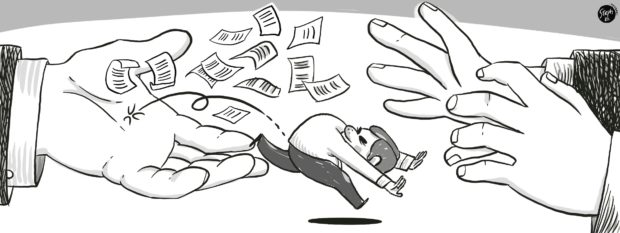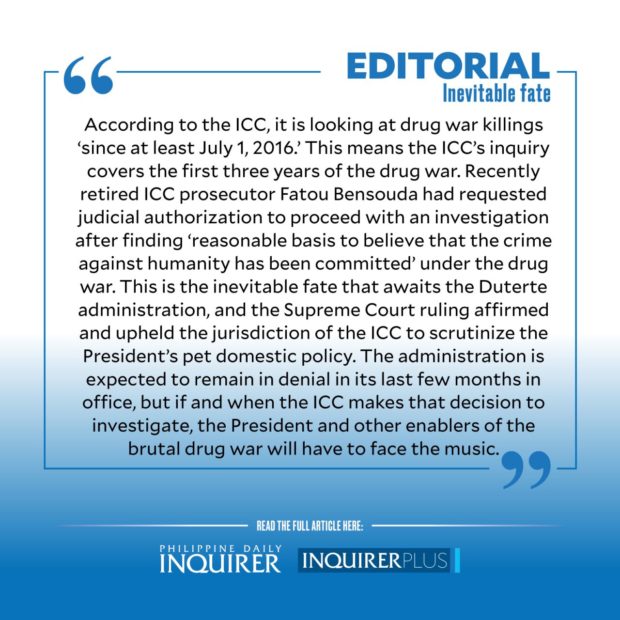Inevitable fate

In a ruling that carries far-reaching implications, the Supreme Court recently dismissed petitions filed by opposition senators and other groups questioning the legality of President Duterte’s move to withdraw the Philippines as a state party to the Rome Statute, the multilateral treaty which created the International Criminal Court (ICC).
Sen. Francis Pangilinan and other senators argued the President should have sought the concurrence of the Senate prior to his move to quit the ICC. The President had announced the withdrawal after The Hague-based tribunal, which prosecutes individuals for genocide, war crimes, crimes against humanity, and aggression began an inquiry into his brutal drug war in February 2018.
In a 101-page resolution dated March 16, 2021, but released only on July 21, the high court dismissed the petitions for being moot, since the United Nations had already accepted the Philippine withdrawal and that the government had met the requisites for annulling its membership.
But Malacañang can’t pop the champagne over the ruling. The Court, in a unanimous decision of its 15 members, laid down two vital instructions.
First, the high tribunal—in no uncertain terms—stated that Mr. Duterte cannot evade the ICC processes by virtue of the withdrawal.
“Withdrawing from the Rome Statute does not discharge a state party from the obligations it has incurred as a member,” it declared. “Consequently, liability for the alleged summary killings and other atrocities committed in the course of the war on drugs is not nullified or negated here.’’
Citing Article 127(2) of the Rome Statute, the Supreme Court pointed out that since the country’s withdrawal from the ICC took effect on March 17, 2019, all acts committed up to that date were still within the ICC’s jurisdiction: “Even if it has deposited the instrument of withdrawal, it shall not be discharged from any criminal proceedings. Whatever process was already initiated before the [ICC] obliges the state party to cooperate.”
According to the ICC, it is looking at drug war killings “from at least 1 July 2016 to 16 March 2019.’’ This means the ICC’s inquiry covers the first three years of the drug war. Recently retired ICC prosecutor Fatou Bensouda had requested judicial authorization to proceed with an investigation after finding “reasonable basis to believe’’ that “crimes against humanity’’ were committed under the drug war.
This is the inevitable fate that awaits the Duterte administration, and the Supreme Court ruling affirmed and upheld the jurisdiction of the ICC to scrutinize the President’s pet domestic policy.
The second vital principle laid down by the high court was that the President did not have absolute powers to unilaterally set aside an international treaty.
“The President had no sole authority and the treaty negotiations were premised not only upon his or her own diplomatic powers, but on the specific investiture made by Congress,” the court said. “In sum, at no point and under no circumstances does the President enjoy unbridled authority to withdraw from treaties or international agreements.”
This strikes at the very heart of Mr. Duterte’s bravado—that he alone is the chief architect of Philippine foreign policy.
“The decision affirms that the realm of treaty-making and abrogation is not exclusive to the President. It is a shared power with the Senate,” Senate Minority Leader Franklin Drilon, a former Senate president, said of the Supreme Court ruling. “This is a win for the Filipino people as treaties will not be subject to the caprice of one man.”
Presidential spokesperson Harry Roque tried to spin this part of the ruling as just “obiter dictum,’’ or a mere opinion that does not set a precedent, and that anyway the petitions were still dismissed.
Roque, once the lead campaigner for the country’s membership to the ICC, had invoked the complementary nature of the ICC as a court of last resort, pointing out that its probe was not necessary as the Philippines had been allegedly addressing the drug war cases. But so far, only one conviction has been notched in the thousands of drug war killings.
A study by researchers from the University of the Philippines Third World Studies Center said the killings have continued—”at least two people are killed in a day’’—as they logged 3,859 deaths from July 2016 to June 2021, or about half of the 7,000 killings acknowledged by the government.
The drug war has barely dented the illegal drug trade. On July 22, Anthony Almerez—said to be a “big-time drug personality”—was arrested. It turned out he was an employee of the transport and traffic management office of Davao City, the very stronghold of Mr. Duterte and the supposed showcase of his unforgiving approach to law and order.
The administration is expected to remain in denial in its last few months in office, but if and when the ICC makes that decision to investigate, the President and other enablers of the brutal drug war will have to face the music.
















